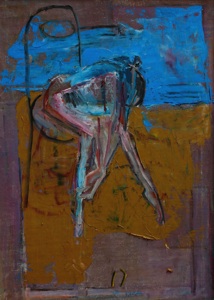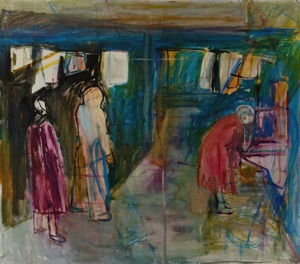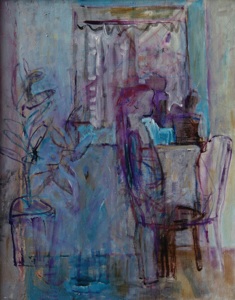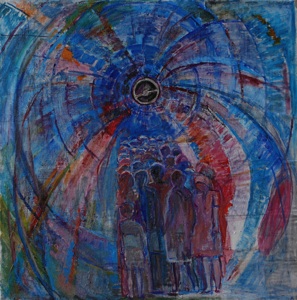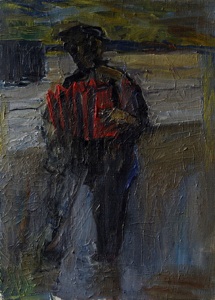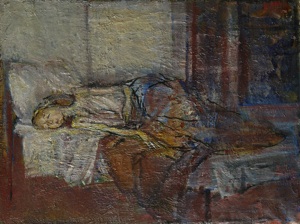Sergey Antonov, artist
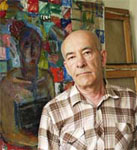
“By the Heavenly gates in the sky, You could hear a child’s cry, Mourning over men, Which have no return...”
Why does a crying child makes beauty tragic, but doesn’t destroy it? I don’t know. I think no one can give an answer. And it’s not because there’s no one experienced enough to explain it. There is just no answer to it, and there won’t be an answer while the great art exists. We can describe the final purpose of art. We can name those few blocks marked Good, Evil, Love, Death. Putting these ideas in order, a painter proclaims eternal principles. Lev Tolstoi and Dostoevski took their own paths to achieve the same goals. The difference in means is crucial for dividing painters into groups. It is an axiom.
So, it is not my fault that I was born to follow my own way. Sometimes I feel a bit sad, but when I work, sadness leaves.
As for means of expression, I appreciate color more. I think the future development of painting will be connected with color. It is difficult to explain. To my mind, it is the most significant component of painting. The sources of future colour development can be found in Russian icons and Van Gogh’s colour discoveries.
I’d like to add a little about accuracy. Art can’t exist without emotions. But one should know laws of composition , color and a lot of other things to paint even a mediocre kind of work. They say: “ Art is not jurisprudence. What for do you need laws?” Of course, there is no definite law in art. But a law or its deliberate breaking leads to the mystery of birth. A law with limits, and the mystery of infinite is another paradox of art.
So I think I still have my chance.“ Like a drunk child in the darkness”.
If you always have this phrase of a Polish poet Julian Tuvim in mind and if it makes you happy, I suppose you have a chance.
Sergey Antonov
Antonov Sergey Alexandrovich
Was born in 1937 in Moscow
In 1966 he graduated from VGIK – All-Russian Institute of Cinematography (faculty of art)
Since 1979, a member of the Moscow Union of Artists, painting section.
Participated in Republican and All-Russian, spring and autumn exhibitions, and also in thematic exhibitions, such as, "Moscow School of Painting", "Exhibition 66", etc.
He had personal exhibitions -internationals and in Moscow.
Personal exhibitions:
1983 - Central House of Writers (ZDL)
1990- Exhibition halls of Moscow Union of Artists on Begovaya street
2000- House of Friendship with Foreign Countries (after a trip to Vietnam at the invitation of the Ministry of Culture)
2005- Central House of Artists on Krymskaya Embankment
2016 posthumous - State Literary Museum
2017 - Embassy of Cuba in Moscow
International exhibitions:
1990-Belgrade
1993-Exhibition at the Consulate of Germany in Moscow
1994-Exhibition in Frankfurt am Main
1999- At the invitation of the Ministry of Culture of Vietnam, an exhibition in Hanoi
His works are in the Russian Museum of St. Petersburg, in museums and art galleries of Kursk,Krasnoyarsk, Nizniy Tagil,New Jerusalem, Magnitogorsk, Literary museum of Moscow, in private collections and art galleries in Sydney, Hanoi, Frankfurt am Main, Belgrade, Finland, Turkey, Hong Kong, etc.
The artist worked a lot with the icon. He believed that “the Russian icon is the top of Russian and world painting.
It’s almost impossible to take something from the icon into modern painting. If only you know the icon perfectly, only then can it give your work a piece of its great beauty and this is a small part -how a diamond will illuminate your work, adding its value, its artistic value.” The artist appreciated in painting, first of all, color and composition, perhaps, that explains his interest in the Russian icon).
Since 1990, he began to write prose, mainly stories.
Since 1994 he became a member of the Writers' Union. His works were published in famous Russian literary magazines. In 1994, was published his book Kandinsky Relief.
Died in 2015, July 30

